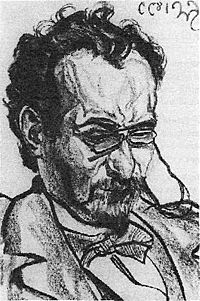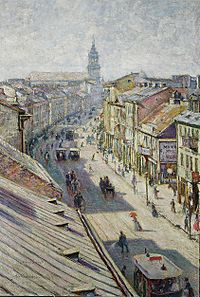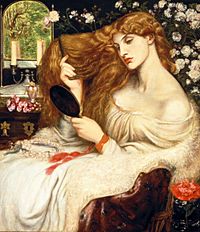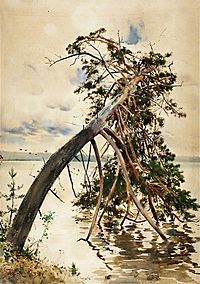Antoni Lange facts for kids
Quick facts for kids
Antoni Lange
|
|
|---|---|

Portrait of Antoni Lange by Stanisław Wyspiański, 1899
|
|
| Born | 1861 or 1863 Warsaw, Poland, Russian Empire |
| Died | 17 March 1929 Warsaw, Poland |
| Pen name | Antoni Wrzesień, Napierski |
| Occupation | Poet, Philosopher, Novelist, translator |
| Period | 19th–20th century |
| Genre | poem, epic poem, narrative poem, novel, short story, essay, drama, frame story |
| Literary movement | Modernism, Symbolism, Young Poland precursor to existentialism, collage, imagism and science-fiction |
| Signature | |
 |
|
|
Philosophy career |
|
| Region | Western philosophy
|
| School | Philosophy of genesis |
|
Main interests
|
|
Antoni Lange (born 1863 – died March 17, 1929) was a Polish poet, philosopher, and writer. He was also a polyglot, meaning he could speak many languages (up to 15!). He worked as a novelist, science writer, reporter, and translator.
Lange was an important figure in Polish Parnassianism and Symbolism, which were popular art movements. He was also part of the Decadent movement. He knew a lot about Romanticism and French literature. He helped people learn more about Eastern cultures. His most famous novel is Miranda.
He translated books and poems from many languages into Polish, including English, French, Hungarian, Italian, Spanish, and Indian works. He also translated Polish poets into French and English. He was one of the most unique poets of the Young Poland movement. People often compare his work to that of Stéphane Mallarmé.
Antoni Lange was the uncle of another famous poet, Bolesław Leśmian.
Contents
Life of Antoni Lange
Antoni Lange was born in Warsaw, Poland. His family was very patriotic. His father fought in the November Uprising against the Russian rule in Poland. His father loved Romantic literature and its ideas.
Antoni Lange started studying at Warsaw University. But around 1880, he was kicked out. This happened because he was involved in patriotic activities against the Russian government. At that time, a Russian official named Apuchtin was in charge of the university.
To earn money, Lange worked as a tutor. He also published his poems using pen names like Napierski and Antoni Wrzesień. He later decided to study in Paris, France. There, he learned about new ideas in literature, philosophy, and art. In France, he explored theories about the mind, Spiritualism (the belief in communicating with spirits), and parapsychology. He also studied the philosophies of Arthur Schopenhauer and Friedrich Nietzsche. He was interested in Eastern religions and different kinds of literature. He even attended literary meetings with the famous poet Stéphane Mallarmé.
When Poland became independent again, Lange returned home. He became a well-known member of the Warsaw Society of Writers and Journalists. This group later became the Polish Academy of Literature. Lange, along with Bolesław Prus and Julian Ochorowicz, were among the first Polish people interested in spiritist ideas. He shared an apartment on Nowy Świat Street with Władysław Reymont, who won the Nobel Prize in Literature in 1924.
Other writers admired Lange. Stanisław Brzozowski called him "a real and not frequently European mind." Julian Tuwim described him as "a master of reflective poetry." As he became more popular, his poems started to show more doubt and sadness. They also became harder to understand. A main idea in his poems from this time was feeling alone and misunderstood by others.
|
Przychodzę do was z daleka... |
I come to you from far away |
|
|
In the early 1900s, Lange stopped being active in public life. He became lonely and was forgotten by many. He kept his last poems in notebooks and never let anyone publish them.
Newer writers, who were part of the avant-garde movement, did not appreciate Lange's style as much. He died in Warsaw in 1929, feeling alone and without much money. He never married or had children.
Antoni Lange was a friend of Stéphane Mallarmé, Jan Kasprowicz, and Stanisław Przybyszewski.
There are only two known portraits of Lange. One of them was painted by Stanisław Wyspiański in 1890.
Antoni Lange's Writing
Lange wrote a lot and in many different styles. He wrote novels like Miranda, short stories, dramas, essays, and poems. His poetry makes you think deeply and shows his wide knowledge. It combines ideas from European culture with Buddhism. A main theme in his writing was the idea of 'extremity' and the 'cycle' of life and death.
Lange liked to use unusual poetic forms. These included acrostics (poems where the first letter of each line spells a word), dactyls (a type of rhythm), pantoums (a poem with repeating lines), and triolets (a short poem with repeating lines). He also wrote poems about village life that explored deeper, metaphysical meanings. He wrote historical songs inspired by the philosophy of Juliusz Słowacki. He also created stories about the origins of the world from different cultures, from Mexico to Japan.
Lange also wrote essays that shared his unique ideas. These essays explored the connection between a poet and the reader. They also touched on ideas about the end of the world (called eschatological issues), like in his works Thoughts and The Grave.
At first, Lange loved beautiful language and new ways of writing. He was influenced by the ideas of Stéphane Mallarmé. But later, he became interested in simpler styles. He looked to folk poets and 16th-century writers for inspiration. He also started using blank verse, which is poetry without rhyme.
Both Lange and Jerzy Żuławski are often called "The Pioneers of Polish Science-Fiction." Lange's short stories from his book W czwartym wymiarze (In the Fourth Dimension, 1912) are seen as early examples of science fiction and weird fiction in Poland. These stories explore themes like hypnosis, an elixir for youth, eternal love, and ghosts appearing in real life. One story, "Dr. Chang Fu Li's Report," is set in Paris in the year 2652. It talks about climate change caused by changes to the Gulf Stream. This leads to Europe freezing over, and China becoming the leading civilization.
Lange's works influenced many poets who came after him. These included Bolesław Leśmian, Antoni Słonimski, and Julian Tuwim. It's interesting that many of these poets also criticized Lange. They thought his work was old-fashioned, strange, and too intellectual.
Lange also worked as a left-wing journalist. He wrote for important Polish newspapers like Pobudka and Tygodnik Illustrowany.
His many translations of classic 19th-century literature are still highly respected today. His translations of The Golem by Gustav Meyrink and poems by Charles Baudelaire, Edgar Allan Poe, and George Gordon Byron are considered masterpieces. He also put together collections of his own translations of poems from Egypt, Syria, Persia, Arabia, India, and Hebrew.
His main inspirations were the poetry of the Three Bards (important Polish Romantic poets), the ideas of Stéphane Mallarmé, and the writings of Charles-Marie-René Leconte de Lisle. He also drew inspiration from ancient Indian Sanskrit epics like Mahabharata and Savitri. Polish Baroque era poetry, especially from poets like Mikołaj Sęp Szarzyński and Józef Baka, also influenced him because of their focus on death.
Love Poems by Lange
Lange wrote many love poems. These poems were influenced by Romanticism, spiritualism, and Indian mythology.
|
Gdzie ty jesteś, bogini? |
Where are you, goddess? |
|
|
Other love poems by Lange, like Vita Nova (meaning "A New Life") written in 1898, show a unique view. They describe a sad poet who feels like a "superhuman" for a moment. This happens because he believes his love is returned. However, there is always a problem between the idea of perfect love and what happens in real life. Lange also wrote about the "painful impossibility" of two lovers' souls truly becoming one forever. He had a sad view of relationships between men and women, believing that complete happiness is never possible.
In Lange's poems, love often makes the person feel "exiled" or "missing" a part of themselves. But at the same time, he believed that lovers could connect and feel the same things. They could share their pain and strong feelings, even if they were far apart.
Deuteronomion, The Hour, Logos, and Sonnets of Veda
A key feature of Lange's writing is the strong influence of Eastern traditions, religions, and philosophies. These include the Veda (ancient Indian texts), Brahminism, and Buddhism.
The Sonnets of Veda, written in 1887, is a series of seven sonnets. They show the seven stages of human life on the path to Nirvana (a state of perfect peace in Buddhism).
Similar to The Sonnets of Veda is the Logos cycle. This is a series of ten sonnets. They discuss ten different ideas about the meaning of history. These ideas come from important Polish Romantic thinkers. The poems are strongly influenced by ideas of messianism (the belief in a savior or a golden age).
The Hour, written in 1894, was Lange's first prose work. This short symbolic novel was published in 1895. It tells the story of Artemis and Aurora, two ancient goddesses. They come down to Earth to see human life. The Hour has some similarities to other famous works like A Dream Play by August Strindberg. The novel includes many mysterious parts that sound like religious writings, psalms, or even greek tragedy. It also mixes prose (regular writing) with elements of poetry and drama.
One of Lange's most important works is Deuteronomion. This is a mystical and occultic poem written in Paris in 1902. It can be hard to understand because it refers to many things. These include the Bible, Kabbalah (a Jewish mystical tradition), Sanskrit writings, and ancient Slavic myths. The poem describes a Poet's spiritual journey. He seeks to gain a special understanding that is both personal and universal. It's interesting that Deuteronomion begins with an "Epilogue to myself" and ends with a "Prologue to the unknown god."
Narrative Poems
Lange brought back narrative poetry, which tells a story. This type of poetry was not common in Polish literature at the time. It was mostly used during the Romantic period by poets like George Gordon Byron. Lange was likely one of the last poets in Poland to write narrative poems. Some of his narrative poems include:
- The Oracle, based on an Indian legend.
- Ilya Muromets, inspired by a Russian folk tale.
- The Vision of Catherine of Alexandria.
Lange also wrote A Song of Płanetnik. This narrative poem talks about a character called a Płanetnik. In pagan Slavic mythology, a płanetnik was a spirit that guarded clouds. They were seen as lonely dreamers who could predict the weather. People believed płanetniks were the lost souls of dead people. To call them, one would sprinkle flour into the wind or fire. Lange's poem tells the story of a young, sensitive man. He loses touch with reality and chooses to live a solitary life.
|
|
Antoni Lange's Philosophy
In Lange's ideas about the universe and how it developed, he believed that the growth of a person's soul happens at the same time as the growth of a nation. He thought that capitalism was bad for this idea. This is because capitalism works against people being unique individuals. If people are not unique, then it's hard to tell what is "bad" or "good." This can make the world's logic get confused.
According to Lange, the world started from a perfect place and is still growing to its highest stage. Eventually, it will return to its original, perfect state. Every step in evolution is a step towards this ideal beginning. The only exception to this "rule of time" is a genius. A genius is someone who exists between different times. In his philosophy, Lange was influenced by thinkers like Thomas Carlyle, Giambattista Vico, and Georg Wilhelm Friedrich Hegel.
Lange was also interested in spiritualism and parapsychology. He used these interests to help shape his own philosophy.
Criticism of Romanticism
An important part of Lange's writing was his criticism of how romanticism influenced modern poetry. In 1924, he started Astrea, a science magazine. It was the first place to discuss Polish and European romanticism.
Lange did not agree with the Romantic idea of sudden "illumination" or insight. He believed that true understanding comes only from learning, intellect, and careful thought. Lange also criticized the strong focus on individualism and the poet's own personality. He believed that the poem itself, as a work of art, was most important. He thought a poem should have its "own existence" and a "clear idea of creation." Because of this, he disagreed with the idea of worshiping the individual poet.
Other Works by Lange
- Vox Posthuma – a philosophical book about a typical "child of the century."
- Godzina ("The Hour") – a mysterious novel about how ideal and real worlds connect.
- Pogrzeb Shelleya ("The Funeral of Shelley") – a poem praising Percy Bysshe Shelley.
- Księgi proroków ("Books of the Prophets") – a collection of poems about the creation of the universe, influenced by Buddhism, Zoroastrianism, and Islam.
- Exotica – a historical poem about the beginning of the world, God, man, and woman.
- Pogrobowcy ("Posthumous Verses") – a collection of early poems influenced by positivism.
- Rozmyślania ("Contemplations" or "Thoughts") – a philosophical poem about the dead, influenced by Romanticism, Baroque poetry, and decadentism.
- Widzenie świętej Katarzyny ("The Vision of Saint Catherine of Alexandria") – a story about what happens when people believe "God is dead."
- W czwartym wymiarze ("In the Fourth Dimension") – one of the first science-fiction books in Polish literature.
- Miranda – a mysterious novel about a sad love story and a vision of a perfect woman in an ideal civilization.
- Róża polna ("The Wild Rose")
- Atylla ("Attila")
- Malczewski – a play about the life of the Polish Romantic poet Antoni Malczewski.
- Vita Nova – a series of 11 philosophical poems about ideal love, pain, and loneliness.
- Pieśni dla przyjaciół ("Odes to Friends") – a collection of poems dedicated to Polish poets like Jan Kasprowicz.
Selected Translations by Lange
Antoni Lange translated many important works from different languages, including:
- English (poems from Alice in Wonderland by Lewis Carroll, poems by Lord Byron, Edgar Allan Poe, short stories by Herbert George Wells, Paradise Lost by John Milton, Novum Organum by Francis Bacon)
- French (poems by Charles-Marie-René Leconte de Lisle, Charles Baudelaire, Théodore de Banville, selected works by Gustave Flaubert, poetry by Maurice Maeterlinck)
- Italian (works by Giovanni Pico della Mirandola, New Science by Giambattista Vico)
- German (works by Arthur Schopenhauer and Friedrich Nietzsche)
See Also
 In Spanish: Antoni Lange para niños
In Spanish: Antoni Lange para niños
 | Leon Lynch |
 | Milton P. Webster |
 | Ferdinand Smith |




